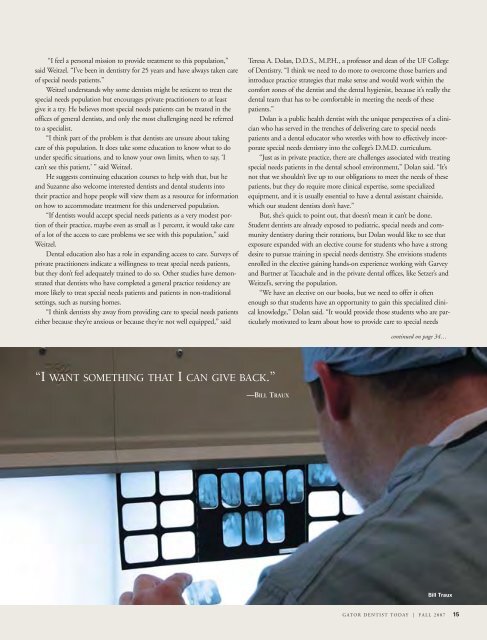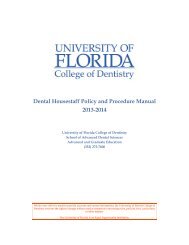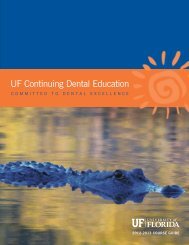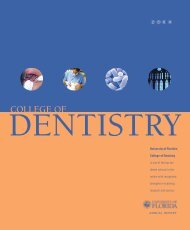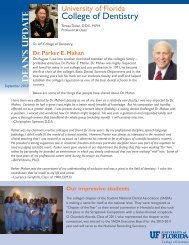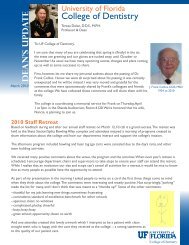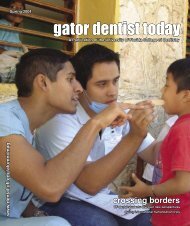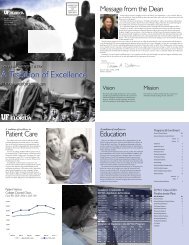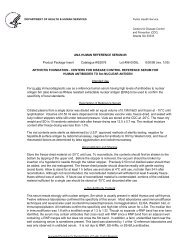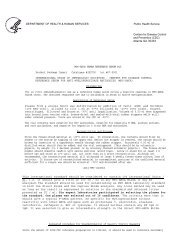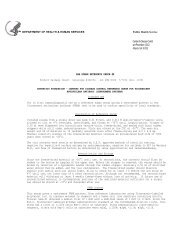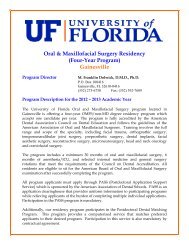Today - College of Dentistry - University of Florida
Today - College of Dentistry - University of Florida
Today - College of Dentistry - University of Florida
You also want an ePaper? Increase the reach of your titles
YUMPU automatically turns print PDFs into web optimized ePapers that Google loves.
“I feel a personal mission to provide treatment to this population,”<br />
said Weitzel. “I’ve been in dentistry for 25 years and have always taken care<br />
<strong>of</strong> special needs patients.”<br />
Weitzel understands why some dentists might be reticent to treat the<br />
special needs population but encourages private practitioners to at least<br />
give it a try. He believes most special needs patients can be treated in the<br />
<strong>of</strong>fices <strong>of</strong> general dentists, and only the most challenging need be referred<br />
to a specialist.<br />
“I think part <strong>of</strong> the problem is that dentists are unsure about taking<br />
care <strong>of</strong> this population. It does take some education to know what to do<br />
under specific situations, and to know your own limits, when to say, ‘I<br />
can’t see this patient,’ ” said Weitzel.<br />
He suggests continuing education courses to help with that, but he<br />
and Suzanne also welcome interested dentists and dental students into<br />
their practice and hope people will view them as a resource for information<br />
on how to accommodate treatment for this underserved population.<br />
“If dentists would accept special needs patients as a very modest portion<br />
<strong>of</strong> their practice, maybe even as small as 1 percent, it would take care<br />
<strong>of</strong> a lot <strong>of</strong> the access to care problems we see with this population,” said<br />
Weitzel.<br />
Dental education also has a role in expanding access to care. Surveys <strong>of</strong><br />
private practitioners indicate a willingness to treat special needs patients,<br />
but they don’t feel adequately trained to do so. Other studies have demonstrated<br />
that dentists who have completed a general practice residency are<br />
more likely to treat special needs patients and patients in non-traditional<br />
settings, such as nursing homes.<br />
“I think dentists shy away from providing care to special needs patients<br />
either because they’re anxious or because they’re not well equipped,” said<br />
Teresa A. Dolan, D.D.S., M.P.H., a pr<strong>of</strong>essor and dean <strong>of</strong> the UF <strong>College</strong><br />
<strong>of</strong> <strong>Dentistry</strong>. “I think we need to do more to overcome those barriers and<br />
introduce practice strategies that make sense and would work within the<br />
comfort zones <strong>of</strong> the dentist and the dental hygienist, because it’s really the<br />
dental team that has to be comfortable in meeting the needs <strong>of</strong> these<br />
patients.”<br />
Dolan is a public health dentist with the unique perspectives <strong>of</strong> a clinician<br />
who has served in the trenches <strong>of</strong> delivering care to special needs<br />
patients and a dental educator who wrestles with how to effectively incorporate<br />
special needs dentistry into the college’s D.M.D. curriculum.<br />
“Just as in private practice, there are challenges associated with treating<br />
special needs patients in the dental school environment,” Dolan said. “It’s<br />
not that we shouldn’t live up to our obligations to meet the needs <strong>of</strong> these<br />
patients, but they do require more clinical expertise, some specialized<br />
equipment, and it is usually essential to have a dental assistant chairside,<br />
which our student dentists don’t have.”<br />
But, she’s quick to point out, that doesn’t mean it can’t be done.<br />
Student dentists are already exposed to pediatric, special needs and community<br />
dentistry during their rotations, but Dolan would like to see that<br />
exposure expanded with an elective course for students who have a strong<br />
desire to pursue training in special needs dentistry. She envisions students<br />
enrolled in the elective gaining hands-on experience working with Garvey<br />
and Burtner at Tacachale and in the private dental <strong>of</strong>fices, like Setzer’s and<br />
Weitzel’s, serving the population.<br />
“We have an elective on our books, but we need to <strong>of</strong>fer it <strong>of</strong>ten<br />
enough so that students have an opportunity to gain this specialized clinical<br />
knowledge,” Dolan said. “It would provide those students who are particularly<br />
motivated to learn about how to provide care to special needs<br />
continued on page 34…<br />
“I WANT SOMETHING THAT I CAN GIVE BACK.”<br />
—BILL TRAUX<br />
Bill Traux<br />
GATOR DENTIST TODAY | FALL 2007 15


